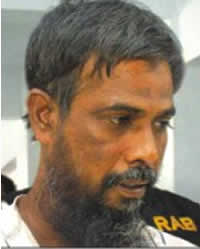Founded in 1984 by Fazlur Rehman Khalil and Qari Saifullah Aktar. The Bangla branch was established in 1992 with assistance from Osama bin Laden. Recruits come mostly from Deobandi madrassahs. HuJI and Fazlur Rehman Khalil are signators of bin Laden's declaration of war on the west.
leaders met Tarique Rahman a few days before the August 21 grenade attack in 2004 and got the go-ahead to stage the blasts.
Lutfozzaman Babar, then state minister for home, Harris Chowdhury, political secretary to then prime minister
 Khaleda Zia
Khaleda ZiaThree-term PM of Bangla, widow of deceased dictator Ziaur Rahman, head of the Bangla Nationalist Party, an apparent magnet for corruption ...
, Ali Ahsan Mohammad Mojaheed, secretary general of Jamaat-e-Islami, then NSI director general Brig Gen Abdur Rahim and DGFI director Brig Gen Rezzaqul Haider Chowdhury were present at that meeting, held at Hawa Bhaban in the capital's Banani.
The attack was the outcome of collaboration between HuJI, influential leaders of BNP and Jamaat, and some officials of the home ministry, police, Directorate General of Forces Intelligence (DGFI), National Security Intelligence (NSI) and Prime Minister's Office (PMO).
This is what Sherlocks have found in further probe and described in the supplementary charge sheet in the August 21 murder case. The Daily Star has lately obtained a copy of the charge sheet submitted in July.
The August 21 blasts at an Awami League rally on Bangabandhu Avenue killed 24 leaders and workers including Ivy Rahman, wife of now President Zillur Rahman, and injured 300 others including Sheikh Hasina, now prime minister.
According to the charges, leaders of banned Death Eater group Harkatul Jihad al Islami (HuJI) had two meetings with Tarique, elder son of Khaleda and the then senior joint secretary general of BNP.
Both were held at Hawa Bhaban, widely considered the alternative centre of power during the last BNP-Jamaat coalition rule.
At the first meeting, in early 2004, HuJI leaders sought support in executing their plans to assassinate Sheikh Hasina and other top AL leaders. BNP politician Mofazzal Hossain Kaikobad had helped arrange the meeting.
Tarique assured the HuJI men of all-out support.
At the second meeting, which took place in mid-August, he reiterated his assurance to HuJI boss Mufti Hannan and his associates.
For the second meeting, HuJI leaders Mufti Hannan, Moulana Abu Taher, Moulana Sheikh Farid and Moulana Tajuddin went to Hawa Bhaban on a microbus of Al Markazul Islam, a non-government organization.
Moulana Abdur Rashid of Al Markazul was with them, but he was left waiting on the ground floor when they went upstairs to meet Tarique.
On August 18, three days before the attack, the HuJI leaders met Babar at the residence of former BNP deputy minister Abdus Salam Pintu.
Owner of Hanif transport Mohammad Hanif and BNP ward commissioner Ariful Islam Arif were present at the meeting.
Babar and Pintu assured the Death Eater leaders that Hanif and Arif would help them in every way and that "they would receive all administrative assistance."
The Arges grenades used in the attack were smuggled in from Pakistain. Tajuddin, Salam Pintu's brother, had supplied the grenades, which were taken to Mufti Hannan's Badda office from Pintu's Dhanmondi residence on August 20.
The first charge sheet in the August 21 case was placed in 2008 against 22 people including Salam Pintu and 21 HuJI leaders and workers.
The supplementary charge sheet was submitted on July 3, accusing 30 more people including Tarique, Babar, Harris and Mojaheed.
It says some police officials deliberately did not take necessary security measures so that the perpetrators had no difficulty staging the blasts and fleeing the scene.
The then Dhaka Metropolitan Police commissioner Ashraful Huda, who later went on to become the Inspector General of Police, went abroad on the day of the attack without ordering adequate security arrangements for the AL rally.
On his return, he did not take any punitive steps against the law enforcers who were negligent in their duties on the rally venue.
The then IGP Shahudul Haque purposely did not update himself with the security measures taken on the rally venue.
He did not even visit the scene after the attack, though it was only around 500 yards from his office. He also did not issue any directives to identify or arrest the perpetrators.
Tajuddin, supplier of the grenades, left the country for Pakistain on instructions from Babar. Khaleda Zia was aware of this, continues the charge sheet.
Tajuddin was given a fake passport with the name "Badal".
Saiful Islam Duke, Khaleda's nephew and also private secretary, Duke's brother-in-law and DGFI official Lt Col Saiful Islam Joarder, and another top DGFI official Major Gen (rtd) ATM Amin had helped him flee the country on October 10, 2006.

 Over seven and a half years after the Ramna Batamul blast, the Criminal Investigation Department (CID) yesterday pressed charges against 14 operatives of banned Islamist outfit Harkatul Jihad Al Islami (Huji) in two cases filed for the carnage.
Over seven and a half years after the Ramna Batamul blast, the Criminal Investigation Department (CID) yesterday pressed charges against 14 operatives of banned Islamist outfit Harkatul Jihad Al Islami (Huji) in two cases filed for the carnage. Police yesterday arrested two wanted
Police yesterday arrested two wanted